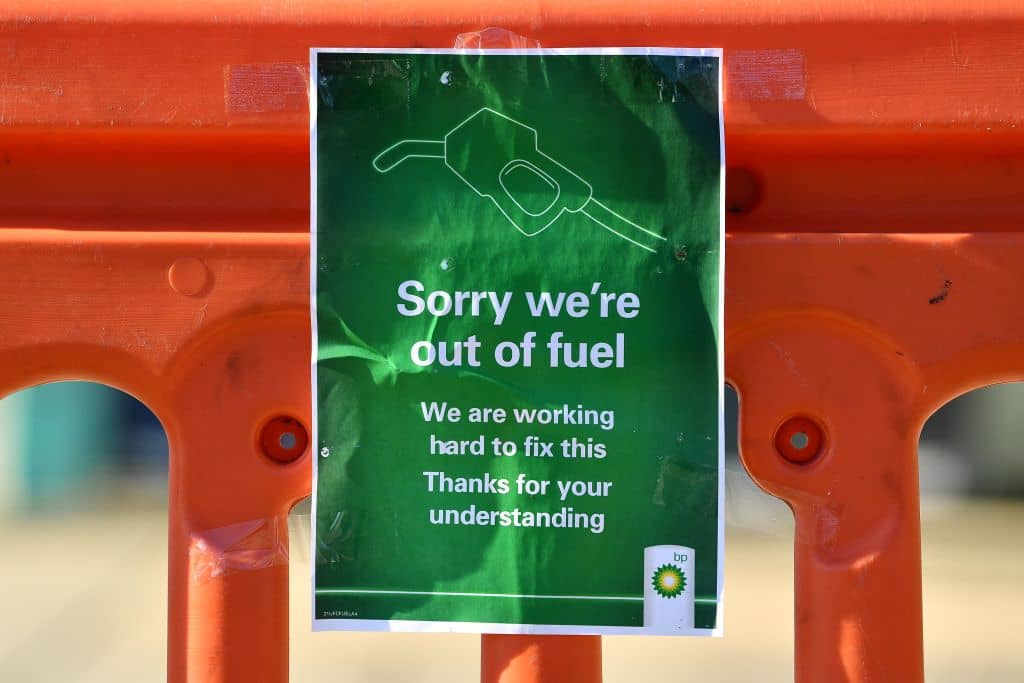All current ills in the world, of course, can be blamed on two things: climate change and Brexit. So far, there are few people blaming the rationing of petrol and diesel on extreme weather-related to climate change (although give it time), but the usual suspects have certainly been quick out of the blocks to blame it all on Brexit. Lord Adonis, for example, has claimed:
‘Brexit is now leading to fuel-rationing’
BP has blamed its inability to keep petrol stations stocked on a shortage of lorry-drivers, but can that really be blamed on Brexit?
In July, the Road Haulage Association (RHA) published a survey of 615 haulage firms as to what they thought was the cause of the then already-developing driver shortage. They were given a list of possible contributory factors and told they could choose as many, or as few, as they liked.
While Brexit is seen as an important factor, it is far from the only reason contributing to driver shortages
A total of 58 per cent mentioned Brexit – the same proportion who identified the retirement of drivers. IR35 – HMRC’s crackdown on what it regards as bogus self-employment – was mentioned by 53 per cent, the inference being that it is hard to recruit drivers when they are unable to take advantage of being freelance.
Another 48 per cent mentioned ‘drivers leaving industry’ as a cause, 47 per cent cited low pay rates, 39 per cent Covid and 33 per cent mentioned other factors.
In other words, while Brexit is seen as an important factor, it is far from the only reason contributing to driver shortages.
An alternative insight is provided by other figures put out by the RHA. The association’s claim that Britain has a shortage of 100,000 drivers has been widely cited in recent weeks. However, that needs to be set in the context that before Brexit – and the pandemic – it was already claiming there to be a shortage of 60,000 drivers.
It doesn’t show how it arrived at these estimates, but taking them at face value it would mean that the shortage of drivers has worsened to the tune of 40,000 since Brexit and pandemic.
The RHA also gives the following figure: that in a normal year 72,000 candidate sit their HGV tests and 40,000 are successful. In 2020, however, lockdowns led to the loss of 30,000 test slots. As a result, only 15,000 drivers completed their training. In other words, 25,000 of that extra 40,000 shortage since the beginning of 2020 would seem to be directly attributable to disruption to the testing system caused by the pandemic.
That leaves 15,000 missing drivers to be blamed on other causes. Yet some of this would surely have happened anyway, due to long-term structural changes in the industry. For years, HGV-driving has been an old man’s occupation: the average age of a lorry driver, according to the RHA, is 55, with 13 per cent over the age of 60. As drivers reach retirement age they are not being replaced – a problem which was endemic since before Brexit and the pandemic.
It is impossible to disaggregate the influences of Brexit and Covid-19 on the loss of drivers from EU countries. If a driver who was working in Britain in 2019 has returned, say, to their native Poland, is that because they have been offended by Brexit, or do not want to go through with the bureaucracy associated with retaining the right to work in Britain? Or is it because Covid-19 restrictions have made it difficult to travel across borders?
Without interviewing a large number of lost EU drivers we have no way of knowing what was going through their minds when they left Britain – and no-one seems to have done this research.
All we can be sure about is that the haulage industry was already heading for crisis before Brexit and Covid-19 but that both have contributed to a worsening of the situation, though possibly not by as much as many people would like to believe.
It is an irony that Brexit and Covid coincided so as to confound anyone who tries to make sense of the effect of Brexit on the UK economy. It as if the virus wanted Brexiteers and Remainers to slug it out for ever after.







Comments